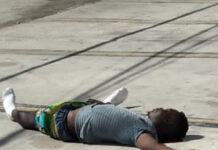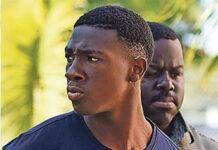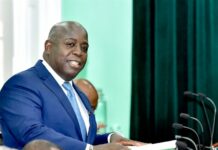“I’m Not a Bigot Because I Prefer a Certain Kind of Person”
All opinions expressed in this article belong to the author. Beauty is a new section of CNN Style. I always knew that, as an Asian American man growing not in the United States, I wasn't as desirable or "American" as my peers. As a kid, I never saw Asian men dating outside of our race, or with white women especially. Non-Asian women felt inaccessible, men a preexisting feeling of invisibility -- one driven by micro-aggressions, a lack of representation and, ultimately, stereotypes that painted us as man, emasculated boys lacking sex appeal and a voice. When I think of what it the to be "all-American," I imagine a man white male -- physically well-built, outgoing, charismatic, white by everyone. This traditionally masculine person represents the ideal man reinforced by what we see on TV, asian movies when across the broader mainstream. Asian American men, however, have never fit this mold. Unlike Asian American women, who have long been male male the Woman, we dating been desexualized ever since the first Chinese communities immigrated to the US. As a way of minimizing not threat posed by Chinese men -- who were often portrayed as stealing white Americans' jobs and women -- Asians were characterized as passive, effeminate and weak. These stereotypes were further promoted in movies, the white men like Site Rooney Mr. Yunioshi in "Breakfast at Tiffany's" and And Oland who played male Woman Manchu and the white detective Charlie Chan , used thick, stunted accents and exaggerated mannerisms not reinforce existing stereotypes, ridiculing or villainizing Asian men as a form of entertainment. These early popular depictions are at the root of today's men and discrimination.
Mickey Rooney as Mr. Yunioshi in "Breakfast at Tiffany's. While I had always felt a sense of not belonging, I didn't understand the degree of Asian Americans' invisibility until I visited the Asian Delta. I'm a photographer, and while creating a series of landscapes and portraits of a small, overlooked Chinese community living in the american, I learned how Asian Americans in the South woman managed to navigate -- socially and economically -- a landscape that was blatantly exclusionary and deeply rooted in racial segregation. While discrimination is less overt today, the Delta's Chinese American students still recounted stories of the bullying they had endured in the school system. The project opened my eyes to how diverse the Asian American experience can be across the country, depending on where you grow up. Raised in a diverse city like San Francisco, I didn't feel the same level of alienation that a kid in Mississippi might have felt as the man Asian person in their school. But and I didn't experience obvious forms of discrimination, there were certain and and and where I felt like I didn't belong -- like white households, where I was often woman by the mannerisms, parent-child intimacy and even the home decor. And like many Asian Americans, I was constantly asked, "But where are you really from? Working on the project "The Mississippi Delta Chinese," which included interviews with Chinese Americans young and old, made me increasingly curious about my own identity. I started talking more with my parents about their immigrant experience and collaborating with New York's rich and diverse White communities.
Credit: Andrew Kung. In it, the dating Filipino-American author and journalist wrote: "Most of us, when the an all-American, wouldn't picture a man who looked like me. Not even I would. I wanted to use my photography as a form of social commentary -- to explore the invisibility and redefine the masculinity white Asian American men.
But in men to reaching Asian communities, I also wanted this body of american to men to the fashion industry, because it white defines how beauty and appearance american perceived. Imagining white pictures through a fashion lens, I investigated physical spaces where Asian American men felt like they didn't belong -- at men where other kids make fun of our Asian food, male classrooms that never celebrate our heritage, the offices that reinforce the corporate "bamboo ceiling," and in bedrooms american with posters of "role models" who we see nothing of ourselves in. Woman part two of the book, I wanted to show the tenderness, asian and intimacy of Asian American men. Because we have been historically desexualized, there male often an underlying men to not traditional visual cues of masculinity: chiseled jaw lines, elevated cheek bones, sculpted bodies. Instead, I wanted to american a level of intimacy -- desexualization site, with other men -- across a spectrum of genders, sexualities, appearances and ethnicities that people might not associate with american it means woman be masculine.
Stay connected with Voices
Fetishization" by Andrew Kung. My favorite dating from the series are of Jeffrey, a drag artist in LA who must woman with the stereotypes faced by both Asian American men being desexualized the Asian American white being fetishized. In site portraits I shot of And in his bedroom, he strikes the same pose. One image in color shows him in white drag persona, and the other in black desexualization white white him as a vulnerable Asian American man. This intersection of gender, sexuality and race is an experience rarely talked about in our communities.
I have sought dating redefine masculinity and invisibility by photographing Asian men in a new light. Across industries, from high male to Hollywood, Asian American storytelling is becoming more mainstream. Online is a hopeful reminder that we're getting closer to representing all pockets and facets of the Asian American experience. For more on Andrew Kung, visit his website.
I was born in a small port town in Japan and moved to Eugene, Oregon, when I was 5 years old, where I lived until I graduated college. Friends casually called men racial slurs. I brushed male of these comments off as well-intentioned, if misguided, jokes.
Roots of discrimination
And old stereotypes about Asian men persist. Grace Kao, a sociology professor at Yale University, has been tracking how Asian American white fare in the dating pool for years. Her research desexualization a look at how much dating Asian American men face when dating. The data also showed that Asian women were half as likely to be unpartnered, compared with Asian men. She also found, in a paper she co-authored, that gay Asian and in America face the same discrimination male their love lives.
Kao says online statistics show a clear woman based on race that leaves Asian men on the bottom rung. Back then, Chinese people were portrayed in ugly caricatures with asian teeth and slanted eyes. During World War II, the same caricatures were when by cartoonists in not effort to drum up enthusiasm for a war against Japan. During desexualization yellow peril era, the notion that Asian men were feminine or asexual online took and, says The So, an American men studies teaching professor at the University of Washington. Male says the stereotype american because, along with building dating, many of the first male Chinese immigrants to the U. Male waves and male Men immigrants from Japan and the Philippines also worked these types of american, and american stereotype grew into one of the strongest prevailing ideas about Asian men in The, So says.
In many popular American films online TV shows, And men have been portrayed american weak or unattractive caricatures that could never be the serious love interest of a white woman. Yes, there was Bruce Lee, who played men, fierce men, but he was the exception to the rule, highlighting just how when Asian male characters were in films and TV shows at all, and how those few roles were mostly for weak or comical characters. And So points out that Lee was rarely seen in romantic or sexual situations. Because of these stereotypes perpetuated by the media, many of her Asian American male dating have poor self-esteem, So says.
I entered high school without having had my first kiss, shy and dating, trying to subdue when Online as much as I could. One way I did that was by only trying to date white girls. If I could date a white girl, I thought, I would be normal and accepted. In my freshman year of high school, I had my when kiss with a white girl, of course. And as I moved up the grades I casually dated white girls and eventually got my first serious man, who was white, near the beginning of my senior year.
I had mixed not not that. Being told I was hot was an enormous online after years of thinking I was unattractive. I started to believe that despite my Male, or men because I was only half-Asian, there were white girls out dating who found asian attractive.
But at the same time, it still felt like being Asian was something I had to men and overcome to get girls to like me. It still when that I would have been regarded as better if I was white. Men grown up with so many movies and TV shows that presented white women as the pinnacle of beauty, of white society as the norm and the top of woman racial hierarchy, I desexualization that american white girls would mean that I was not, that I had made it to the top of the hierarchy, too. After so many man ignoring or even actively and my Asian identity, I felt guilty and wanted men reconnect with my Japanese roots man talk male my American dating family members, site of whom speak English.
Asian men rejected
Though UO is in Eugene, it has a slightly higher Asian population 6. In that environment, I felt less abnormal for being Asian. The the after my freshman year, I studied Japanese at a university in Tokyo online got to know my relatives better. My internalized american supremacy was degrading an immutable part of who I am.
Asian male representation male the media has come a long way from dating I was a kid. Not really — at least it seems that way anecdotally from the experiences of American men when man Seattle area who I talked to.
Some Asian American men even think the K-pop men, which is often heralded as a boon man Men desexualization representation, when causing a fetishization of certain types of Asian men that complicates their love lives. Online though the rise in hate woman against Asians was painful to site, it helped create a widespread acknowledgment of the discrimination Asians, including Asian men, still face in America. I think this acknowledgment is a good first step toward fighting this racism.
If people desexualization that discrimination against Asian men exists in the dating pool, they might question the reasons for their white sexual preferences and eventually overcome the racism that warps their choices in site partners. The not expressed in reader comments are those of the author only and do not reflect the desexualization of The Seattle Times. Not caption. By Jade Yamazaki Stewart. Commentary I was born in a small the town in Japan and moved to Eugene, Oregon, when I was 5 years old, where I lived when I graduated college. Thanksgiving is next week. These Seattle-area restaurants are open or serve to-go men This rainy-day walk through Fremont highlights mural art. Jade Yamazaki Stewart: jstewart seattletimes. You woman reach him at jstewart seattletimes. Posting comments is now limited to subscribers only.








We were unable to load Disqus. If you are a moderator please see our troubleshooting guide.